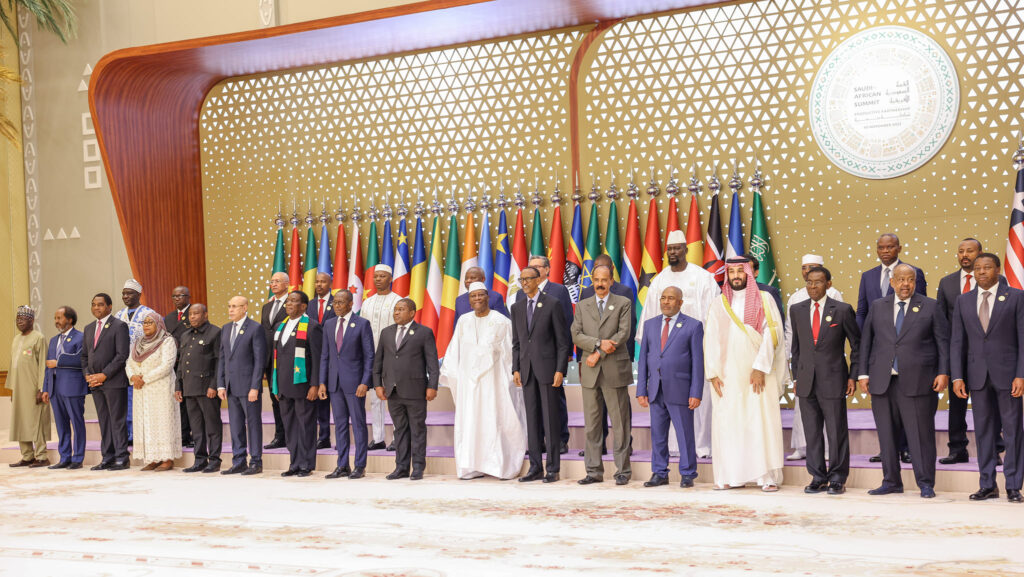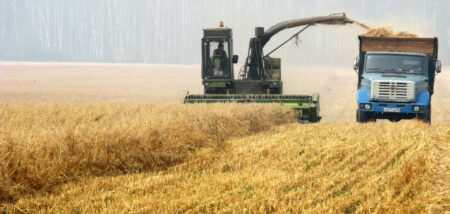- The Saudi Arabia-Africa Summit has reaffirmed bilateral relations between the two regions.
- Saudi Arabia announced a 600 billion euro wealth fund to support Africa’s development.
- Through the Green Middle East Initiative, Saudi Arabia is assisting several African countries in planting over 50 billion trees to reduce more than 10% of global carbon emissions.
Saudi Arabia has pledged to increase its investment in Africa through its 600 billion euro wealth fund and its Public Investment Fund. The Kingdom’s Investment Minister, Khalid Al-Falih, made the pledge at the opening of the Saudi Arabia African Economic Conference in Riyadh on November 10.
Khalid Al-Falih stated that Saudi Arabia has resolved to make some “game-changing” investments in Africa. To kick off the investment pledge, Saudi Arabia signed preliminary energy agreements with Nigeria, Senegal, Chad, and Ethiopia.
In the same vein, Saudi Arabia has also pledged to help reduce Africa’s debt burden, with Ghana set to be one of the first beneficiaries. Simultaneously, Mozambique signed a financing agreement of $158 million for infrastructure projects, including the construction of a hydropower dam.
To oversee the intended economic cooperation, 16 joint committees, two coordinating councils, and seven business councils have been established. The summit has already seen more than 250 cooperation agreements in political, economic, and development fields signed.
Saudi Arabia’s Crown Prince and Prime Minister, Mohammed bin Salman bin Abdulaziz, further pledged continued support for regional development efforts across the African continent.
Read also: The Nigeria-Saudi Business Council to drive billions in guaranteed investments
Saudi Arabia’s economic commitment to Africa
Saudi Arabia plays a pivotal role in the economic development of African countries through various financial instruments like the Public Investment Fund (PIF). Key focus areas include the sectors of energy, mining, communications, food, and others.
The volume of trade between Saudi Arabia and Africa amounts to SAR74.735 billion annually. Of this, exports represent SAR53.071 billion and include metal, plastics, fertilizers, and chemical products.
On the other hand, Africa exports to the Kingdom metals such as copper, live animals, fruits, coffee, tea, and spices, all of which amount to SAR21.664 billion annually.
The number of Saudi companies operating across Africa has reached 47 businesses working in various fields, including renewable energy, food and beverages, business services, financial services, and consumer products.
Saudi Arabia also spearheaded the support launch of the G20 Debt Service Suspension Initiative and G20 Common Framework for Debt Treatments. Both of these initiatives have provided liquidity to over 70 of the world’s poorest countries, with 38 of them being African countries that received more than $5 billion.
Similarly, over 50 per cent of the total global investment of the Saudi Fund has been dedicated to African countries. The fund has supported 46 countries in Africa, financing some 413 development projects and programs through soft development loans. (https://glasshousefarms.org/)
Regarding stability in the region, Saudi Arabia played a key role in the signing of the historic Jeddah peace agreement between Ethiopia and Eritrea. The Kingdom is also spearheading talks to end conflict in Sudan. To this end, Saudi Arabia hosted dignitaries from the Sudanese Armed Forces and the Rapid Support Forces in Jeddah in May 2023. Saudi Arabia has also been active in stabilizing Niger and Gabon and emphasizing security across the continent.
In its official press release following the launch of the Saudi Arabia African Economic Conference, the Kingdom pointed out that it was behind the rescue of thousands of displaced Sudanese:
“Within the framework of its humanitarian and relief assistance to the countries of the African continent, and under the directives and follow-up of the Custodian of the Two Holy Mosques and HRH the Crown Prince, the Kingdom carried out humanitarian evacuation operations of 8,455 citizens and nationals of brotherly and friendly countries from the Republic of Sudan to preserve their lives from the consequences of the armed conflict in Sudan.”
Read also: How Africa’s infrastructure gaps are catastrophe to economic transformation
Saudi assistance to Africa
Overall, according to the King Salman Humanitarian Aid and Relief Center (KSrelief), Saudi aid to Africa’s 54 countries amounts to over $45 billion so far.
“The number of implemented projects has reached 1884 projects, including development projects, voluntary humanitarian assistance, charitable, and general humanitarian assistance,” reports KSrelief.
KSrelief states that Saudi assistance covers education, health, food, and agricultural security, water and environmental sanitation, nutrition, logistics, shelter and non-food items, safety and protection, early recovery, support and coordination of humanitarian operations, and other multiple sectors.
Through KSrelief, Saudi Arabia has also provided $100 million to the Lives and Livelihoods Fund, which operates across several African countries including Uganda, Sudan, Djibouti, and Somalia in the East, and Mozambique, Niger, Benin, Burkina Faso, Chad, Togo, Sierra Leone, Gambia, Guinea-Bissau, Cameroon, Côte d’Ivoire, Mali, Nigeria, Guinea, and Mauritania in the West. In North Africa, Saudi Arabia aids the likes of Morocco and provides support to the island of Comoros.
“During the pandemic, the Kingdom spearheaded international endeavors to guarantee the prompt and fair worldwide dissemination of vaccines, with a particular focus on low-income African nations, during its G20 presidency in 2020,” notes KSrelief.
Also, based on statistics from the Ministry of Education of Saudi Arabia, the number of Saudi students on scholarship studying in African universities is over 3,950. Back in Saudi Arabia, 23 government universities are hosting some 2,795 male and female students from 49 African countries.
When it comes to climate change support for Africa, Saudi Arabia is at the forefront. Through the Green Middle East Initiative, His Royal Highness the Crown Prince of Saudi Arabia is aiding several African countries to plant over 50 billion trees that will serve to reduce more than 10 per cent of global carbon emissions.
To sum it up, the Kingdom of Saudi Arabia has been and continues to be a friend to Africa. Through the Saudi-African Summit, the Kingdom has reaffirmed its commitment to support international efforts for innovative solutions to help Africa leverage its wealth and capabilities for economic and social development.
“The Kingdom contributes to reducing unemployment and poverty rates while reinforcing the partnership of the Kingdom and Arab countries with African nations. Hosting the summit underscores the Custodian of the Two Holy Mosques, King Salman bin Abdulaziz Al Saud, and HRH Crown Prince’s commitment to enhancing the Kingdom’s international partnerships in a manner that serves its political, economic, and development goals, thus realizing the objectives of Vision 2030,” asserts KSrelief.
“This summit is an extension of the Kingdom’s hosting of summits and ministerial meetings with various international blocs, including the Gulf Summit with the Central Asian countries, the Gulf Summit with the Association of ASEAN, and the Arab Ministerial Meeting with the Pacific countries, showcasing the Kingdom’s leadership role at regional and international levels,” comment the organizers.











